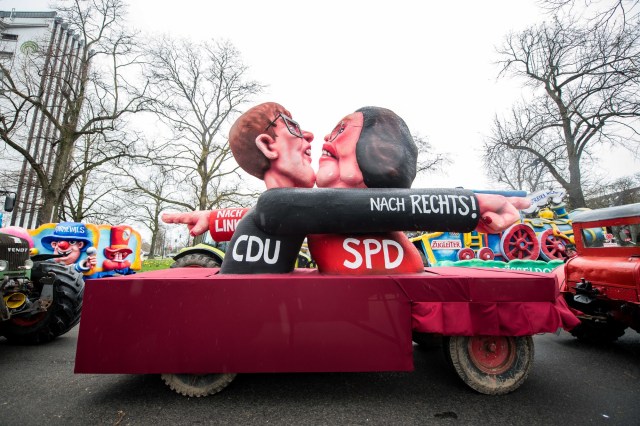Credit: Lukas Schulze/Getty Images

The decline of the centre-Left across most of Europe is every bit as striking as the rise of populism – and arguably more important.
Germany is no exception to the general trend. The country’s main party of the centre-Left is the SPD. Or at least it was. In the 1998 federal election the party got a commanding 41% of the vote. But by 2017, its vote share was down to 20.5%.
Remarkably, losing half your support in less than twenty years is not a uniquely bad record for a European social democratic party – some have fared worse. However, the decline of the SPD is special because the SPD is special.
In a feature for Spiegel Online, Christoph Hickmann and Veit Medick remind us of the party’s long history:
“The SPD is more than 155 years old. It outlived the monarchy and survived National Socialism; it transformed itself from an organ of class conflict into a big tent-party; and it has weathered schisms and political realignments. The SPD has been through more than all the other parties in German parliament combined.”
Of the major parties of the Weimar Republic, only the SPD returned as a major party when democracy was restored after the war.
So, why is a movement that survived Hitler now facing what the authors call a “make-or-break year?” The SPD is currently polling at around 15% – behind the Greens and only just ahead of the national populist AfD. Unless it can show some signs of recovery in the upcoming European and regional elections, its minor party status will be confirmed. To make the challenge ten times more difficult, it must be met while the SPD reluctantly serves as a junior partner to Angela Merkel’s centre-right CDU. A party that fails to get into government is one thing; a party that fails to get into opposition is something else. It’s hard to strike out in a bold new direction when you’re propping up the status quo.
On one level, the cause of SPD’s weakness isn’t hard to discern – its traditional support base is falling to pieces.
“According to the German Institute for Economic Research, between 2000 and 2016, the percentage of all voters who were working class dropped from 37 percent to 19 percent. And while 48 percent of workers voted for the SPD in 1998, by 2017 that figure had fallen to less than a quarter.”
But so what? The demographic sands are continually shifting under all political parties. Millions of people who voted one way twenty years ago won’t vote that way twenty years later – especially not the dead ones. Parties that survive reinvent themselves – assembling new voter coalitions from the living.
So, why can’t the SPD reinvent itself now? In part, it’s because of the difficulty of making an electoral offer that is both coherent and capable of mass appeal:
“The SPD is being asked to look after Germany’s industrial workers, but also the environment. It is expected to be an open, worldly party, while at the same time ensuring that not too many refugees come, especially not the wrong ones. The SPD is expected to simultaneously appeal to a broad spectrum of voters, from AfD adherents to liberal students.”
Hickmann and Medick try to find shreds of hope for the SPD. At one point they quote a young feminist writer called Sophie Passman – who they describe as the “epitome of the left-liberal milieu”. Over a bowl of “vegan apple porridge” she explains why, instead of the Greens, she decided to join the SPD:
“‘Because I love the idea of the party,’ she says. ‘I know of few better concepts than solidarity, a united society and people who are prepared to sacrifice some of their own prosperity for the greater good, because they have an idea of what such a world could look like.’”
Do these ideals provide a basis on which the SPD could rebuild? If they do, then perhaps the party doesn’t need the traditional working class to be as big as it once was. Just about anyone can experience the rough end of contemporary capitalism. A degree does not provide immunity from workplace exploitation, the housing crisis or crippling debt. If enough people think they’d be the net beneficiaries of a little more “solidarity” and “sacrifice” they might just change the course of politics.
However, the Left-wing political movements of the past found strength in more than numbers alone. There’s a reason why the rise of socialism and social democracy is almost always rooted in the industrial working class. It’s because trade unions, cooperative societies and other working class institutions forged new bonds of community where the old ones had been shattered by industrialisation and urbanisation. The solidarity wasn’t just one of ideals, but of a common way of life – requiring a sacrifice not only of prosperity, but also individualism.
But ours is a liberal society now – and the only way of life is your own. While Left leaning voters still support the pooling of wealth (especially other people’s), the sharing of identity is anathema.
Facilitated by proportional representation, the centre-Left fragments. Major parties shrink, minor parties surge – each finding a niche within a different cultural tendency. And that, much more than the decline of the working class, is the SPD’s fundamental problem. Politics is no longer an arena for collective action, but a market catering to self-expression.










Join the discussion
Join like minded readers that support our journalism by becoming a paid subscriber
To join the discussion in the comments, become a paid subscriber.
Join like minded readers that support our journalism, read unlimited articles and enjoy other subscriber-only benefits.
Subscribe